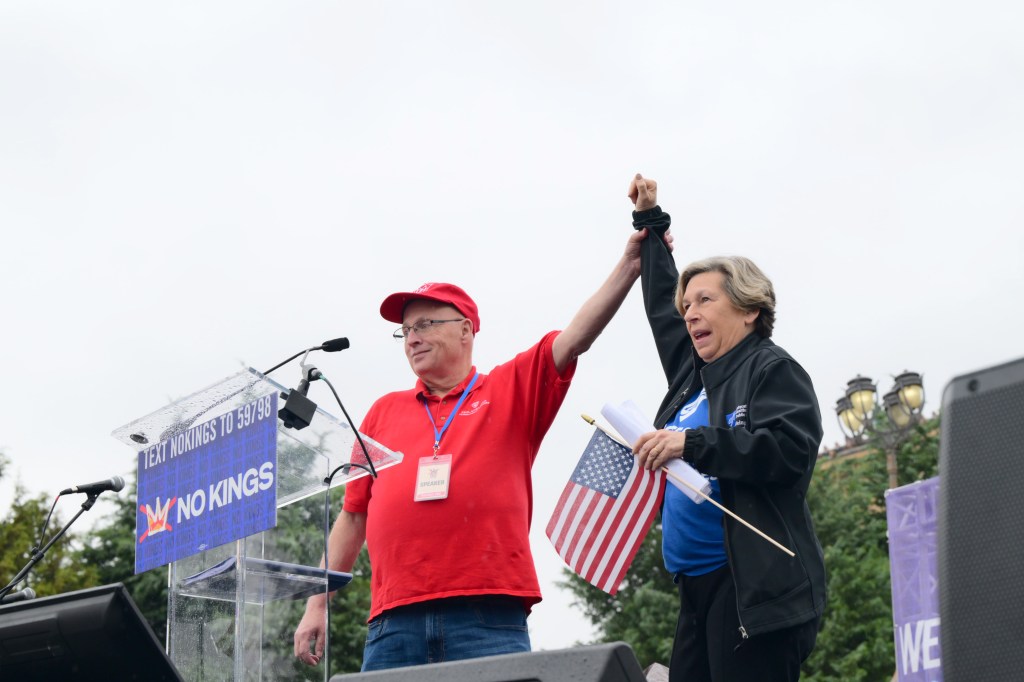
Thousands of protesters this weekend gathered in cities and towns across America to declare their battle cry against Donald Trump: “No Kings.”
But as Democrats are looking to get their mojo back after a year of cascading political nightmares, perhaps a king is just what this beleaguered opposition party needs. Someone to crack heads, break the party’s written and unwritten rules, and point the faithful in one, clear direction. The problem isn’t just that Democrats have no king—it’s that nobody appears to be in charge at all, or can figure out how to deliver them from their current role as Washington’s hapless minority party.
When I asked one former official at the Democratic National Committee (DNC) who the party’s leader is, the official responded with the obvious answer: “We don’t have one.” Instead, Democrats are plagued by sophomoric infighting in their institutions, haunted by the living specter of former President Joe Biden, and beset by ideological factionalism. And even with Trump’s struggles in his first several months in office, the Democratic Party’s poll numbers remain abysmal, with its favorability far below that of Trump and the GOP.
The latest example of Democratic discord, the New York Times reported, is the resignation of two of the DNC’s labor-affiliated board members, Randi Weingarten and Lee Saunders. Weingarten, the longtime president of the American Federation of Teachers, wrote in a letter to chairman Ken Martin that she would decline her renomination to the national committee because “I appear to be out of step with the leadership.” She had supported Martin’s opponent Ben Wikler in February’s election for DNC chair, and upon his election, Martin removed Weingarten from the party’s powerful rules committee.
Weingarten’s letter was dated June 5, though it was only obtained by the Times on Sunday, which raises questions about what took so long for the teachers’ union leader’s complaints to become public. If Weingarten was hoping to start a party-wide coup against Martin in the past week, it does not seem to have materialized, with only Saunders—the president of the American Federation of State, County and Municipal Employees—among the party’s union leaders to join her exodus.
(“I would say it’s not a bad thing,” the former DNC official told me of Weingarten’s resignation. “Especially after COVID, teachers unions are not popular and we should divorce ourselves a bit from them as a party. Allow elected officials and candidates to have some space.”)
But that’s not to say Martin is secure in his position. The party’s younger and more left-leaning bloc is also at odds with the chairman, thanks to the weeks-long public dispute between Martin and another newly elected DNC officer, vice chair David Hogg. In short, the 25-year-old Hogg launched an organization to back progressive primary challengers to sitting Democratic members of Congress. Martin insisted that an officer of the Democratic Party shouldn’t be pushing to oust elected Democrats and that Hogg’s extracurricular activity was hurting Martin’s ability to lead the party.
By May, the committee had determined that it had violated its own convoluted rules in holding its elections for the vice chair seats occupied by Hogg and another progressive activist, Pennsylvania state Rep. Malcolm Kenyatta. Hogg and Kenyatta were removed from their posts, and while Kenyatta was once again elected to the same post, Hogg declined to run again.
The camp to watch is the party’s center-left establishment, with members who were behind Martin in last winter’s elections but who are now increasingly frustrated with the chair’s lack of urgency, energy, and, well, leadership. This is the biggest and most influential bloc within the DNC, and its problem with the Hogg contretemps was that Martin wasn’t swift and tough enough in dealing with the brash young activist. One person I spoke with pointed to the DNC’s vaunted launch last week of a streaming YouTube show called The Daily Blueprint, the most recent episodes of which received just a few hundred views, as an example of the uninspired bloat that Martin has overseen.
The establishment may not be abandoning Martin anytime soon, not as long as there’s no clear and better alternative to head up the DNC. But all the turmoil underscores how consequential and devastating Biden’s decision to run again in 2024 has been for Democrats. His aborted reelection campaign, which forced the party to scramble to nominate Kamala Harris with just a few months to go before Election Day, has left Democrats without someone to dictate to the party apparatus—as Barack Obama and Bill Clinton did in their own ways, and as Trump certainly has in his party.
The work of responding to Trump and the Republican Party increasingly falls to outside groups, from political action committees like EMILY’s List to grassroots groups like Indivisible Action, which organized the aforementioned “No Kings” protests. And from California Gov. Gavin Newsom’s attempts to make himself both a new kind of Democrat and Trump’s chief foe, to Michigan Gov. Gretchen Whitmer’s confusing effort to play nice with the current president, there’s no coherence from the wide field of potential presidential candidates about how the Democratic Party should be conducting the difficult task of digging itself out of its post-2024 hole.
Most likely, Democrats will be saved from their leadership by the missteps of their opposition, or delivered back into power not by their grand vision for America’s future but simply because they’re the alternative to the Republican bums the voters will (eventually) want to throw out.

















